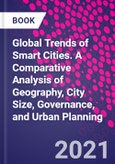Global Trends of Smart Cities provides integrated analysis of 135 cities that participated in the IBM's Smarter Cities Challenge in 2010-2017. It establishes evidence-based benchmarking of city geographies, city sizes, governance structures, and local planning contexts in smart cities. This book uses a combination of descriptive statistical analysis and real-world case study narratives to evaluate the ways in which each individual urban variable or their combination matter in the diversity of smart city approaches around the globe. It is acknowledged that the Smarter Cities Challenge offers a particular set of smart initiatives and is not representative of all smart cities around the world. Nevertheless, the global presence of the Challenge across five continents and its involvement with 135 cities of all size and socioeconomic status provides a solid foundation to conduct comparative research on smart cities. Considering limited comparative research available in the smart city debate, this book makes significant contribution in understanding the state of smart city development in urban governments worldwide.
Please Note: This is an On Demand product, delivery may take up to 11 working days after payment has been received.








